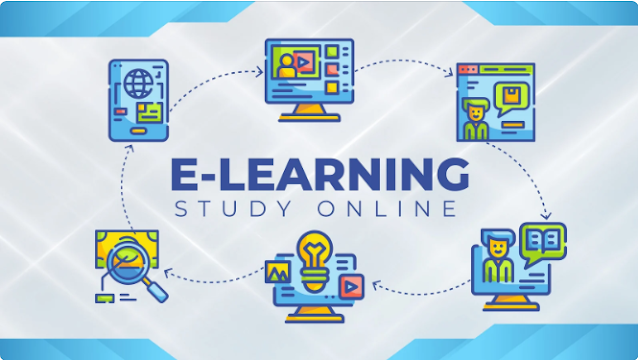- Get link
- X
- Other Apps
- Get link
- X
- Other Apps
In the modern age of technology, cloud technology has brought about a revolutionary transformation in numerous sectors, and one particular industry that has reaped immense benefits from its progress is the eLearning sector. Cloud technology has paved the way for innovative solutions, transforming traditional educational methods into dynamic and interactive online learning platforms. This article will delve into the impact of cloud technology on the eLearning industry, highlighting its benefits, challenges, and the future it holds.
Introduction
The eLearning industry has flourished significantly in recent years, and cloud technology stands as a prominent catalyst behind its achievements and progress. Cloud technology encompasses the process of storing, organizing, and delivering data and applications via the Internet, eliminating the need for dependence on local servers or individual devices. Through harnessing the capabilities of cloud technology, eLearning platforms have transformed how individuals access and immerse themselves in educational content.
Understanding Cloud Technology in eLearning
Cloud tech enables eLearning platforms to store vast amounts of educational content in remote servers, making it accessible to learners anytime and anywhere. Learners have the advantage of effortlessly reaching course materials, videos, interactive exercises, and assessments via internet-connected devices such as laptops, tablets, or smartphones. This flexibility has eliminated geographical barriers, allowing individuals from diverse backgrounds to access quality education conveniently.
Benefits of Cloud Technology in eLearning
Accessibility and Flexibility
Cloud tech empowers learners by providing easy access to educational resources. Learners can study at their own pace, accessing content and completing assignments at their convenience. Whether it's a student juggling multiple responsibilities or a working professional pursuing further education, cloud-based eLearning platforms offer the flexibility needed to accommodate diverse schedules.
Cost-Effectiveness
Implementing cloud tech in eLearning significantly reduces costs associated with traditional classroom setups. Educational institutions can minimize expenses related to physical infrastructure, maintenance, and transportation. Learners can also save on travel costs and study materials, as cloud-based platforms often offer affordable subscription models or free access to educational content.
Collaborative Learning
Cloud tech fosters collaborative learning experiences by providing tools for real-time collaboration and interaction. Learners can engage in group discussions, virtual classrooms, and peer-to-peer collaborations, enhancing their understanding through shared knowledge. This collaborative approach promotes active learning, critical thinking, and problem-solving skills among learners.
Scalability and Personalization
eLearning platforms powered by cloud tech offer scalability, accommodating a large number of learners simultaneously. Cloud servers can handle increased traffic and ensure uninterrupted access to educational resources. Furthermore, personalized learning experiences can be tailored to individual learners' needs, allowing adaptive learning paths and customized content recommendations based on performance and preferences.
Challenges and Solutions
While cloud tech brings numerous advantages to the eLearning industry, certain challenges must be addressed. These challenges include data security concerns, infrastructure reliability, and connectivity issues. However, the industry has responded with robust security measures, redundant infrastructure, and offline learning capabilities to mitigate these challenges and ensure uninterrupted access to educational content.
Future of Cloud Technology in eLearning
The future of the eLearning industry is intertwined with the evolution of cloud tech. As technology continues to advance, we can expect further enhancements in cloud-based eLearning platforms. Artificial intelligence (AI), machine learning (ML), and data analytics will play pivotal roles in delivering personalized learning experiences, adaptive assessments, and intelligent content recommendations. Moreover, the integration of virtual and augmented reality (VR/AR) technologies will create captivating and interactive learning environments, taking learner engagement and knowledge retention to new heights.
Conclusion
Cloud tech has undoubtedly propelled the eLearning industry to new heights. Its accessibility, cost-effectiveness, collaborative features, and scalability have transformed traditional educational methods. Learners now have the flexibility to pursue their educational goals regardless of time and location constraints. As cloud tech continues to advance, the eLearning industry will witness further innovation, providing learners with dynamic and immersive educational experiences.
FAQs
Can cloud-based eLearning platforms replace traditional classrooms?
Cloud-based eLearning platforms offer flexible and accessible learning opportunities, but they are not intended to replace traditional classrooms entirely. They complement traditional education methods and provide additional avenues for learning.
Are cloud-based eLearning platforms secure?
Cloud-based eLearning platforms prioritize data security and employ robust measures to protect learners' information. Encryption, authentication protocols, and regular security updates are implemented to ensure data privacy.
Can cloud technology support interactive assessments and feedback?
Yes, cloud tech enables the creation of interactive assessments and provides instant feedback to learners. This enhances the learning process by assessing knowledge gaps and guiding learners toward improvement.
How will AI and machine learning impact cloud-based eLearning platforms?
AI and machine learning will revolutionize cloud-based eLearning platforms by offering personalized learning experiences, adaptive assessments, and intelligent content recommendations based on individual learners' preferences and performance.
What role will virtual and augmented reality play in eLearning?
Virtual and augmented reality technologies will create immersive learning environments, allowing learners to experience simulations, virtual labs, and interactive scenarios. This will enhance engagement and promote experiential learning.
In conclusion, cloud tech is advancing the eLearning industry by providing accessibility, flexibility, collaboration, and scalability. As technology continues to evolve, we can expect even more exciting developments in cloud-based eLearning platforms, offering personalized and immersive educational experiences to learners worldwide.
- Get link
- X
- Other Apps



Comments
Post a Comment